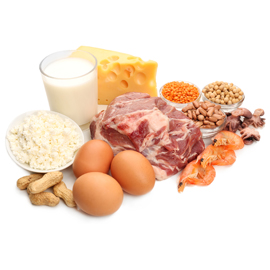The Bottom Line about Protein after Weight Loss Surgery
 Weight loss surgery is a significant help to or those who are trying to make changes to their diet and lose weight. The reason why weight loss surgery is so helpful for so many people is that it encourages greater changes than what is expected during most standard weight loss programs. Most bariatric procedures work by restricting the amount of food that can fit in the stomach at any given time. This means that every meal has to be smaller, otherwise you will likely experience stomach discomfort.
Weight loss surgery is a significant help to or those who are trying to make changes to their diet and lose weight. The reason why weight loss surgery is so helpful for so many people is that it encourages greater changes than what is expected during most standard weight loss programs. Most bariatric procedures work by restricting the amount of food that can fit in the stomach at any given time. This means that every meal has to be smaller, otherwise you will likely experience stomach discomfort.
When you limit your calorie intake in this way, it is essential to take into consideration what type of calories you are putting into your body. When you are consuming a diet of 2,000 or more calories a day, not all 2000 calories need to be from protein. However, after surgery when that number gets cut in half or more, then you need to make sure that specific nutrients like protein are being well-represented.
The Importance of Protein
The average person needs approximately 50 grams of protein per day just for normal health and survival, according to the World Health Organization. After weight loss surgery your daily requirement will be higher than this. Your weight loss surgeon will give you a breakdown of exactly what nutrients you need to incorporate into your daily diet. After having bariatric surgery, this will mean making sure that every calorie you consume is contributing to your diet and nutrient goals.
Protein is an especially important nutrient because it is the building block of all the cellular tissues and muscles within the body. As you lose weight and work on forming muscle, protein is what will support the biological processes to keep you healthy and thriving.
There are many ways that you can get protein in your diet, including through natural whole foods as well as through supplements. Once you are healed from weight loss surgery and are following a whole-foods diet you can get protein from lean meats like chicken and turkey, as well as through fish, beans and some vegetables. You can also increase your daily protein intake by using protein supplements such as protein shakes.
Protein is a fundamental component of any healthy dietary plan. Consult with your weight loss surgeon to find out the best way to get protein in your diet and follow all post-surgical guidelines carefully to ensure your long-term health and success.


